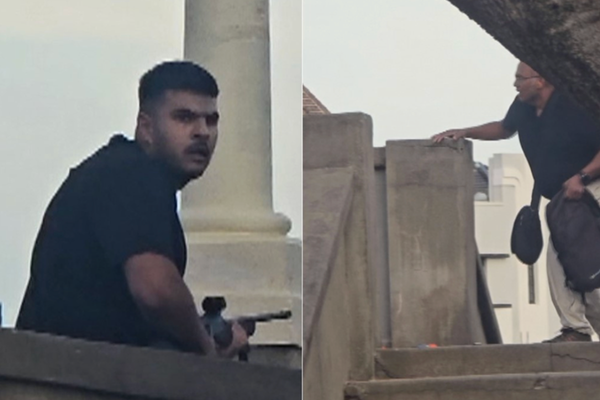
“No foot soldier, no commander, no civilian leader — no-one — can act with impunity.”
That statement is the basis of modern international criminal law, in its post-World War II incarnation. It is the rule of law writ globally, as our failsafe against war crimes, crimes against humanity and genocide.
It forms part of the explanation given by Karim Khan, prosecutor at the International Criminal Court (ICC), for his decision to ask the ICC to issue arrest warrants for three Hamas leaders (including its head Yahya Sinwar) as well as Israel’s Prime Minister Benjamin Netanyahu and Defence Minister Yoav Gallant.
It hasn’t gone over well in every quarter. Netanyahu rejected it “with disgust”; US President Joe Biden called it “outrageous” and Secretary of State Anthony Blinken declared that America “reject[s] the prosecutor’s equivalence of Israel with Hamas”. We’ll come back to that equivalence notion.
The charges against the Hamas leaders include extermination, murder, hostage-taking, rape, torture and outrages upon personal dignity, all war crimes or crimes against humanity under the Rome Statute (the international treaty that established and governs the ICC).
As for Netanyahu and Gallant, the war crimes pinned on them include starvation of civilians, murder, attacking civilian populations, extermination and persecution — not genocide, but just about everything short of it.
Before taking this step, Khan had enlisted a group of six eminent international lawyers, led by Lord Justice Fulford (a former UK appeal judge and ICC judge) and including Amal Clooney and Baroness Helena Kennedy, director of the International Bar Association Human Rights Institute. Their task was to advise Khan whether there was sufficient evidence to lay charges, which they unanimously concluded there was. Their published statement is worth reading: “Why we support ICC prosecutions for crimes in Israel and Gaza“.
As both the experts and Khan have emphasised, this is just step one: the laying of allegations. Nothing has been proven.
The outraged reactions from literally everyone who usually trumpets their devotion to the rule of law — Murdoch’s Wall Street Journal editorialised that the ICC has “disgraced itself over Israel”, republished in The Australian, while Peter Dutton is frantically demanding Australia condemns the ICC — are bordering on the unhinged, given the ICC is an actual court whose jurisdiction is guaranteed by a treaty to which 124 countries have signed up (including Australia).
Putting that aside, one more relevant objection is to the ICC’s jurisdiction over Israeli leaders at all, given Israel (along with the US) has never been a party to the Rome Statute.
The way Khan argues for ICC jurisdiction has two steps.
First, the court has jurisdiction over both crimes committed anywhere by nationals of state parties, and crimes committed by anyone on the territory of a state party.
Second, in 2021, the ICC — noting that Palestine is a state party to the Rome Statute — ruled its jurisdiction extends territorially to Gaza and the West Bank, including East Jerusalem; essentially, the territories occupied, illegally according to UN resolution, by Israel since 1967.
That’s something Netanyahu could contest if he ever fronted the court to face his charges, and it’d be a live legal question without a certain answer. Among other issues, he may be able to assert immunity from prosecution as a national leader.
Before any legal fights can be had, the defendants must be brought physically to court; the ICC is prohibited from conducting trials in absentia. That introduces realpolitik into the equation, the intersection of diplomatic and power political realities with international law.
The ICC has no powers to enforce its orders — there is no international police force it can order to arrest its suspects. It must rely on state parties, whose cooperation it can request to implement the arrest and surrender of an accused to the court. All state parties are theoretically bound to comply.
Practically speaking, this may cause Netanyahu to change his travel plans, because he would be at risk of arrest in some countries. The Hamas leaders face no such problem, because they already live as shadows and their liberty is only likely to end if and when Israel locates and drops a missile on them.
Given none of the accused is realistically going to ever be prosecuted for these alleged crimes, what’s the point? Is this move performative only, or is it — as Clooney et al said — “a milestone in the history of international criminal law”?
I’ve written previously, in relation to the ICJ’s parallel proceedings against Israel, that I see a danger in toothless international legal actions, that they end up creating a façade of accountability in a world where the “international rules-based order” is an increasingly unfunny joke.
I admit I’m unsure. I get the rationale of demanding accountability, even if actual justice is only a remote chance. But I still also worry we are descending into farce, when the world’s most powerful nations treat institutions like the ICC with open contempt — to the extent that the speaker of the US Congress has come out threatening retaliation against the ICC’s judges and staff members personally if it doesn’t back off.
As for “equivalence”, the argument is void. There is no equivalence in war crimes; there are just war crimes. In the end, justice or no justice, nobody’s soul has impunity from the stains their crimes leave behind.







